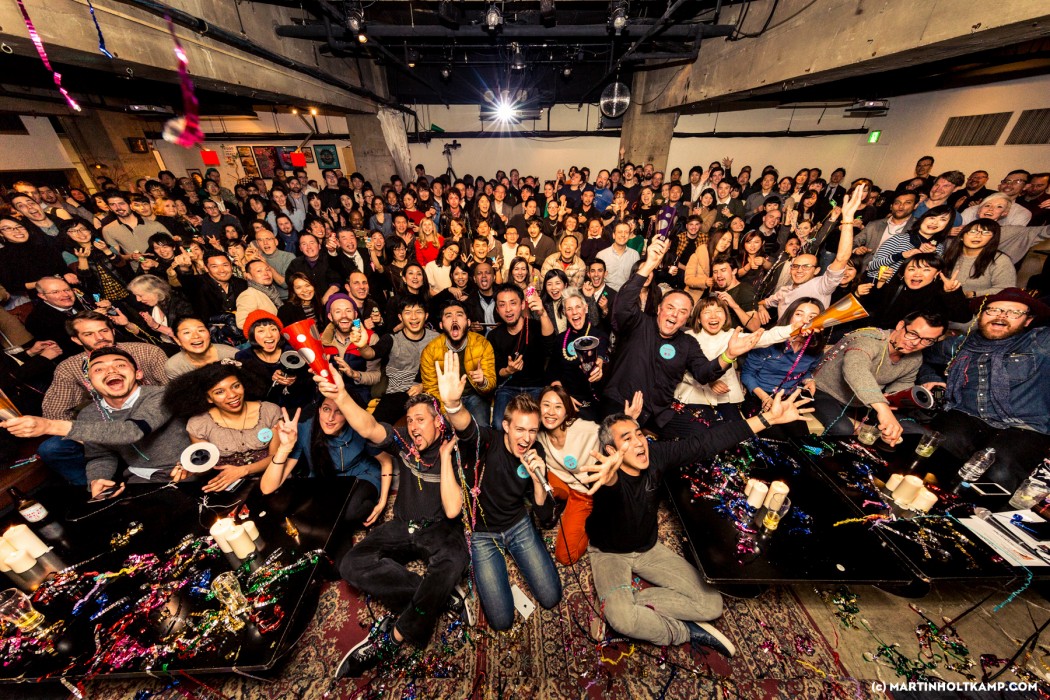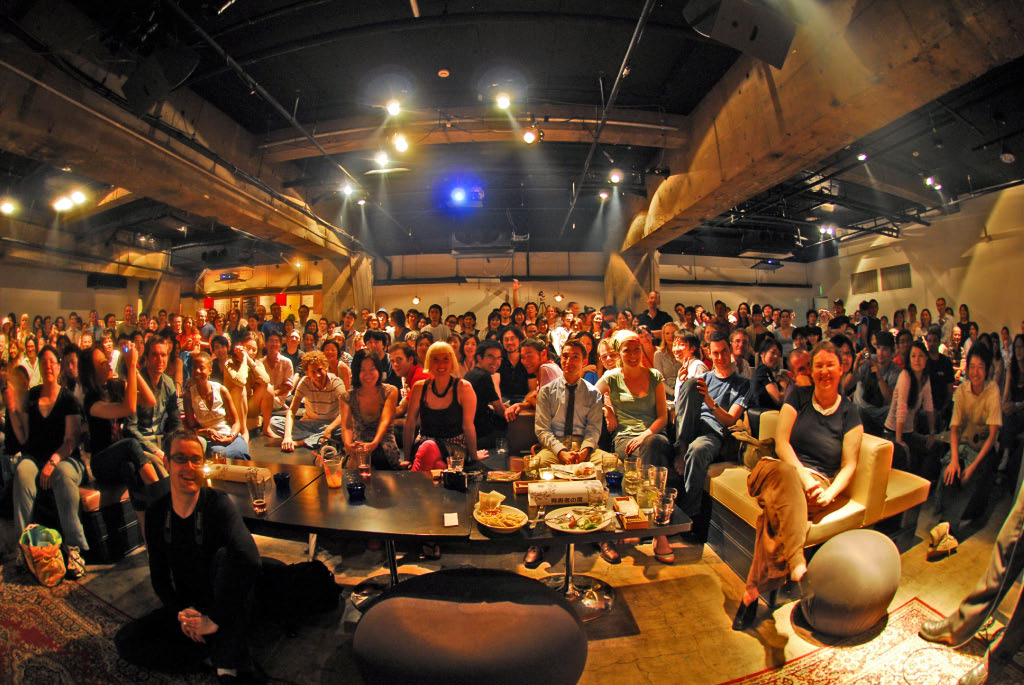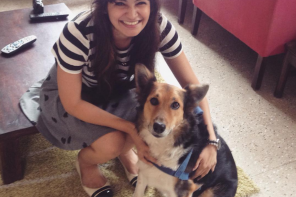It was the year 1988. Mark Dytham and Astrid Klein had just graduated from the Royal College of Art, London. After seven years of studying, Dytham did not want land straight into office, into a pile of papers, working day in and day out. London, at that point in time, was slow and stagnant. However, in Japan, though distant, there was a desire for and acceptance of newness, anything was possible and everything was happening. So Dytham applied for travel scholarship through his local town Milton Keynes Development Corporation and Klein, at that time, had won the Richard Rogers prize scholarship in London. It all fell into place, and they both strolled into Japan, two and a half thousand dollars in each of their pockets, hoping to stay in Japan if they could, if the money would last.
Fast forward to 2016. Dytham, along with Klein, is the co-founder of the Klein Dytham Architecture, easily one of the most successful architectural firms to exist today. They’ve won several awards, held famous exhibitions and have made an impact on Tokyo through their designs and installations that the city will never forget. But perhaps, what they remain most known for is conceptualising Pecha Kucha, the internationally famous presentation style.
Intrigued and awed by his achievements, The Yellow Sparrow got in touch with Mark Dytham and posed a multitude of questions about the creation and progress of Pecha Kucha Nights and Klein Dytham Architecture as well as discovered a plethora of interesting facts about Dytham. He is lively, cheerful, humorous and answers every question with a smile. He commands your respect as he does your attention and is crazily passionate about the work he does, be it architecture or Pecha Kucha.
Pecha Kucha (pronounced pe-cha-ku-cha; it’s Japanese and so the syllables that are used here in this particular word are flat) is a presentation style where the presenter has 20 slides on display for 20 seconds each, and the presentation can move only forward, thereby making giving a total of 6 minutes 40 seconds to convey your idea.
When asked how he came up with the name, he responded, “Well, 10 slides/10 seconds was too short and the next one is 20 slides/20 seconds and that was just the thing with about six minutes and 40 seconds. It had a nice ring to it. We started on the 20th of February at twenty past eight, so 2020. It was really kind of funny!” The name is very unusual; he assures us that it happened purely by chance but worked wonderfully for them. It’s easy to search for and provides results only about these nights (no unrelated results that randomly pop up!)
The entire idea of a Pecha Kucha Night is about slowing down. He says,
There are no video presentations and the reason for that is we want people to stop and look, listen and think about the presentations and that is really, really important; it’s kind of like a zen form of presentation.
Dytham started it as a one off event and never thought it would take the world by storm. It ran for about two and a half years in Super Deluxe (Klein Dytham’s lounge bar) before it started to go all around the world. It was when they held it in the Tokyo Design Week 2005 that people started saying they would like to run it in their own city. The first one was in Bern, Switzerland and around the same time, one Pecha Kucha Night was held in LA. By the end of 2005, it started to take off globally.
Now, it has been 13 years since the first Pecha Kucha Night was organised and he takes immense pride in the fact that the format of PKNs remains the same and there have been no such changes to the idea. “We made a CD-ROM for the first event – not a DVD, a CD-ROM – and it’s exactly the same”, he laughs, “The only difference is that there were more people! We had 14 people who presented on the first night, and now we have around 10, sometimes even 5. So the only difference is that we have less people now!”
Less people or more people, Pecha Kucha Nights are now held in over 800 cities across the globe. With this kind of popularity, surely, some measures would have to be taken to ensure these events follow the standard protocol that is expected of a Pecha Kucha Night? He replies, “We’ve got a standard website, we have a handshake agreement (that we make before a PKN is held in a city for the first time) and we’re in very, very close contact with each of the organisers. If they tell us beforehand that they’re going to organise an event in three or four days, we contact them by email and give them a list of all the latest news – what’s going on, information, graphics.” He likes to get a report back from the organisers after the event to know how it went, how it happened and so on.
They also always make it a point to send a video message to organisers when they have had their 20th event, 40th event and 50th event. Some cities have had their 80th and 90th event as well. In fact, Tokyo itself was going to have 133rd event the day we spoke to Dytham, which just signifies how much of a rage this concept has become. So we wondered if the success of PKNs has altered his life in any way, to which he smiled and told us that it anything at all, it has just made it busier! They get 70-100 emails a day from organisers and although they don’t normally travel for PKNs, but if they have to travel to a city for work or a lecture, then they ask that city in advance if they can organise a Pecha Kucha Night in that time.
Pecha Kucha hasn’t only changed his life but has also touched others’ lives. He told us about one man who went to Europe for a week and attended a Pecha Kucha Night everyday about seven different cities, thereby understanding, experiencing, feeling the pulse of the cities that he would never have known otherwise. These nights have sparked and ignited romances; there are people who have met at PKNs, fallen in love, gotten married, have had babies.
They’re also held in a very relaxed atmosphere and in very, very informal settings like beer gardens, bars, clubs. Dytham says the main reason for that is space. “Bars and clubs are happy to give you free space on Mondays and Tuesdays because they’re looking for 300 people to come and drink their beer. They don’t need anything on Thursdays, Fridays and Saturdays so the idea was that we’ll hold it in these places.” The social development of PKNs is very important. It should ideally be held in a place where people – both presents and viewers- can communicate with each other easily. He says,
Our slogan is still “Thinking and drinking.”
Although the event starts at 8:20 in the evening, people wander in by 7, have a drink and chat with people. There is a beer break in the middle, where people can make conversation with the presenters, which can also be done at the end of the event. It’s a refreshing change; anyone who has ever attended a guest lecture will tell you that the presenter will talk for an hour and a half and will be pulled away by the organiser as soon as he is done talking, leaving no time for a quick question-answer session. This informal setting works tremendously also because several people have stage fright and have never really spoken in public ever, and if you give them a big stage or a theatre to present, they will get very nervous. It’s comfortable for all, it’s an incredible way to relax, make friends and find new contacts.
Some people, though, have criticized it saying how 6 minutes or 20 slides isn’t enough time to fully articulate their ideas. He laughs, “People who think they need more time are those who think themselves as too important.” The point of PKNs is to get people to show their work to the public. There’s no platform in a city where young architects, designers and other creative people can show and share their work, especially if they’ve only done a very small project. He says, “If Astrid and I give a talk for 30 minutes or 90 minutes, we have 300-400 images. It’s fine if you’re well known but you are not; you have only 20 images of your project. And this is what the platform is about.
It’s allowing young people who would not have an opportunity to show their work.
An added advantage is that if someone’s presentation is very boring or if they’re just not that good, you only have to sit through six minutes before it gets over!
The journey however, wasn’t just rainbows and flowers all along. “How to finance it, is the biggest challenge we’re facing even today,” he says, “By keeping it free, we’ve allowed it to go around the world. It’s in 900 cities now; if we had charged $100 for each event, we’d be in 25 cities right now. But earlier it was a baby, and now it’s a big baby. So there are questions like ‘How do we feed it?’”
They have a global sponsor in Autodesk, but now they’re looking for global funds for the cities to contribute to. “We have provided a big service through the website. It’s something that the city itself should pay for! We’re helping promote cities all around the world. We have 6300 presentations from about 900 cities. I think we’re doing a really good job of putting cities on a global platform, so it’s a really solid service that we offer. We provide value so I think you should give some value back.”
So are they planning to make it a paid event? “We want people to add a tiny amount,” he says,
The idea is that people are not meant to be making a profit from this. That’s what it says in our handshake agreement – there are 20 key points and one of them is that this isn’t a vehicle to make money. This value-for-value model is something we’re trying to pursue as a way to keep us afloat. Like I said, we don’t promote and we don’t ask people to either, but we do want to make it sustainable for the future.
Between the Pecha Kucha work that he has immersed himself in and his architectural firm, that has designed homes for celebrities and collaborated with several other famous firms, he’s a busy man. When he’s not working though, he spends time with his kids. You can also find him at one exhibition or the other that is held in Tokyo, a city he would love to discover more of. He’s been in Japan for a long time – about 30 years now –but the country is full of things to see and do, constantly changing, perpetually developing.
He also likes to check Pecha Kucha’s Twitter feed, and is always on the lookout for new posters made by people or just new information about his and Klein’s social presentation idea that was born one day 13 years ago in 2003.
Before we parted, we asked him a couple of questions that he had to answer in only twenty seconds (inspiration from the Pecha Kucha format, anybody?). We learnt that one thing that he definitely would never want to see being presented on a PKN is his family photos! He smiles, “I just want to keep my private photos private!”
If he had to describe PKNs using only three adjectives, which would he use?
It doesn’t take him much time to answer. “Fun, educational, concise.”
We can’t agree more! Pecha Kucha is a presentation style that is light, entertaining and very informative, all at the same time. It has grown bigger and better each year and we’re sure it will continue to grow even more as the years go by. After all, how can something so beautifully simple, so immensely interesting and so much fun not be loved by everyone all over the world?
Yeah, we’re sure what you’re wondering right now, so we’ll answer it for you – yes, Pecha Kucha has had its presence felt in India and it’s there and happening in many cities – Delhi, Mumbai and Bangalore, to name a few. You might want to check if there’s a Pecha Kucha in your city over here. If not, you know what to do (that’s right, start one.)
A brilliant concept by brilliant people, that’s what sums up Pecha Kucha. We wish Astrid and Mark all the best in their work and hope they are ever more successful in every project they undertake!
P.S- Psst, if there was one historical or famous structure anywhere in the world that they both could redesign as per their taste, it would be the Eiffel Tower. It sure is a classic structure, but with their creativity and talent, we wish we could see their take on it!















